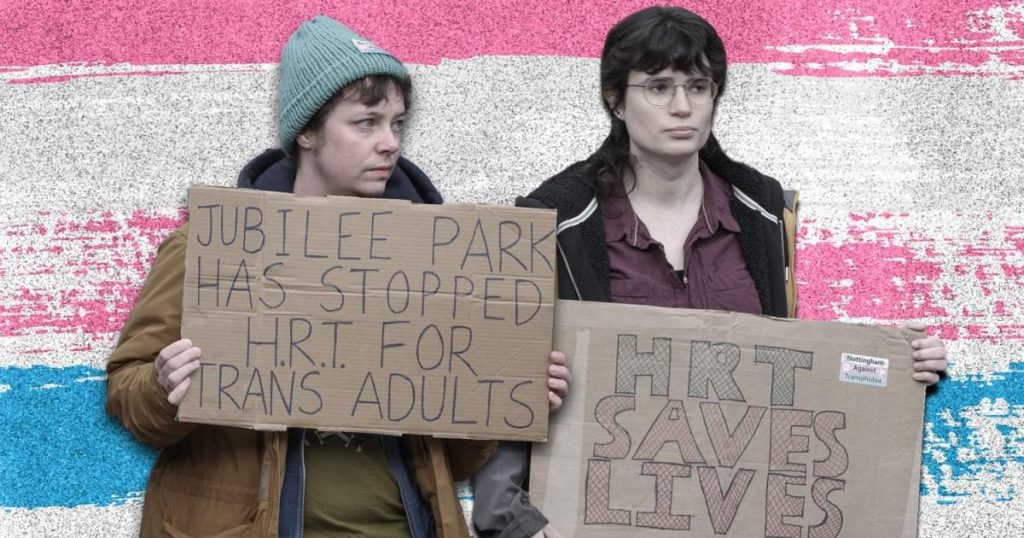Paragraph 1: The Crisis Unveiled
Alex Roberts, a 32-year-old game programmer in Nottingham, received devastating news just before Christmas. Their GP informed them that their gender-affirming healthcare, including testosterone prescriptions, would be discontinued in a few months. This news came after a month-long wait for a simple medication adjustment, leaving Alex feeling abandoned and let down by their healthcare provider, Jubilee Park Medical Partnership. This practice, with locations in Lowdham and Carlton, Nottinghamshire, had been prescribing gender-affirming care, including hormone replacement therapy (HRT), a treatment typically required for life. The decision to withdraw this care has left Alex and other trans and non-binary patients in a precarious position.
Paragraph 2: Justification and Impact
The letter from Jubilee Park, dated December 19th, stated that gender-affirming care is not considered an essential service and falls outside their GPs’ expertise. The practice cited a lack of confidence in prescribing these specialized medications, along with funding issues and the absence of such treatments from the standard GP contract. This decision has profoundly impacted patients like Samathy Barratt, a 29-year-old software engineer who has relied on HRT for six years. Samathy expressed fear of forced detransition, the reversal of the positive physical and mental health changes experienced through HRT, should access to care cease. Studies have indeed shown that gender-affirming hormone treatment can significantly reduce depression and anxiety levels. Reversible changes include alterations in skin texture, muscle mass, hair growth, and fat distribution.
Paragraph 3: The System and its Shortcomings
The UK’s transgender healthcare system involves a three-step process. Individuals experiencing gender dysphoria consult their GP, who then refers them to specialized Gender Identity Clinics (GICs). The GICs diagnose gender dysphoria but do not prescribe medication. Instead, they request GPs to write the necessary prescriptions. This creates a dependency on GPs for ongoing hormonal treatment. The long waiting times at GICs, often exceeding three years, further exacerbate the challenges faced by trans individuals seeking care. Samathy, already struggling with anxiety, expressed the devastating impact of this uncertain future on her mental health.
Paragraph 4: Protest and Alternatives
In response to the impending loss of care, a protest organized by Nottingham Against Transphobia took place outside Park House Medical Centre in Carlton on New Year’s Eve. Dozens of people, including Alex and Samathy, participated, advocating for continued access to prescribed NHS care for transgender individuals. The group emphasizes the importance of fair and equal access to healthcare for all, including non-cisgender individuals who routinely receive HRT and blood tests through their GPs. Faced with the withdrawal of services, patients like Alex and Samathy are left with limited options: switching GPs with the hope of finding a supportive practice, seeking costly private care, or resorting to the risky practice of self-medicating with HRT obtained without a prescription or medical supervision.
Paragraph 5: Costs and Risks of Self-Medication
Private gender-affirming care can be financially prohibitive, with appointments costing up to £500 and hormone medications ranging from £10 to £300 for various supplies and durations. The "DIY HRT" route, while potentially empowering for some, carries significant risks due to the potential for incorrect dosages, contaminated products, and lack of medical supervision, potentially leading to health complications. Alex highlighted the irony of Jubilee Park offering to treat any injuries resulting from self-injection, underscoring the precarious situation faced by trans patients.
Paragraph 6: Hope and Advocacy
Samathy’s complaint to the NHS Nottingham and Nottinghamshire Integrated Care Board (ICB) led to an investigation. While the ICB doesn’t directly fund trans healthcare at Jubilee Park, they requested the practice continue providing care beyond April 2025. However, this offers little immediate reassurance to patients like Alex and Samathy, who await formal confirmation. Their hope rests on increased awareness and understanding within the medical community of the critical need for continued care for vulnerable trans patients. The British Medical Association (BMA) has urged NHS England to address the gaps in service and commissioning, ensuring safe and accessible trans care for all who need it. Jubilee Park, while acknowledging the long wait times at GICs and advocating for more resources for trans care, maintains their support for trans patients, albeit without a clear commitment to continuing the crucial HRT prescriptions beyond April 2025. The fight for equitable and accessible transgender healthcare continues.


